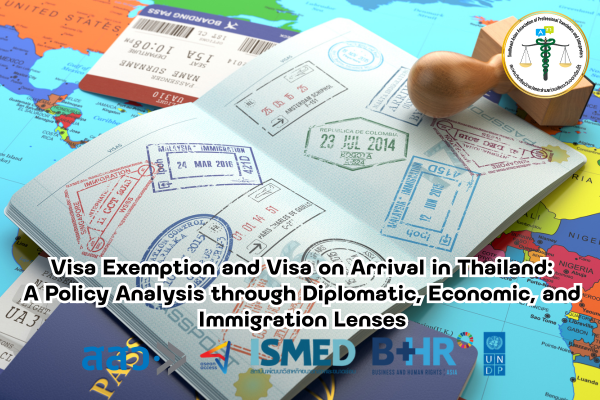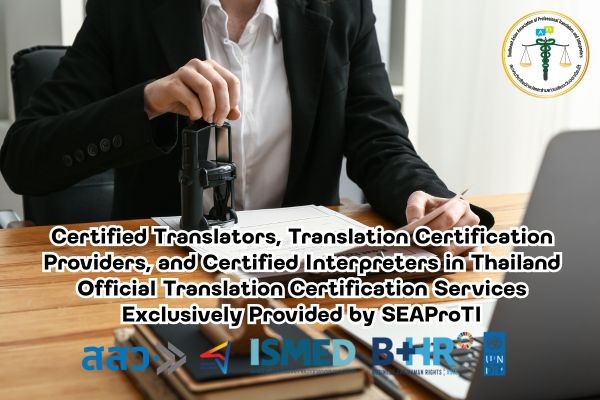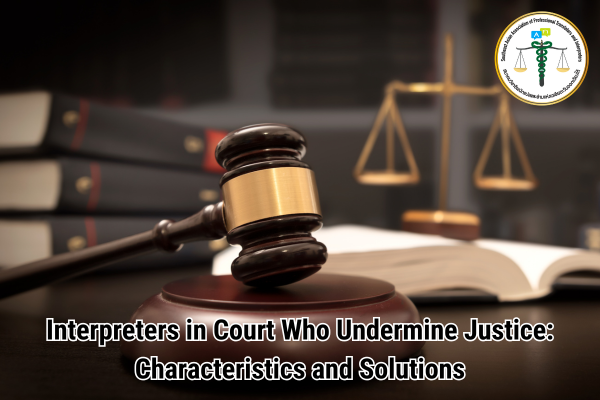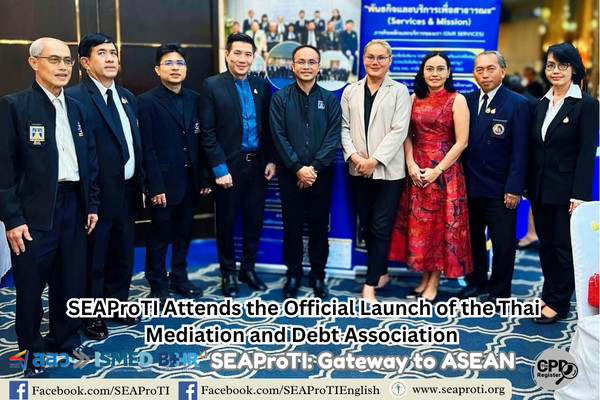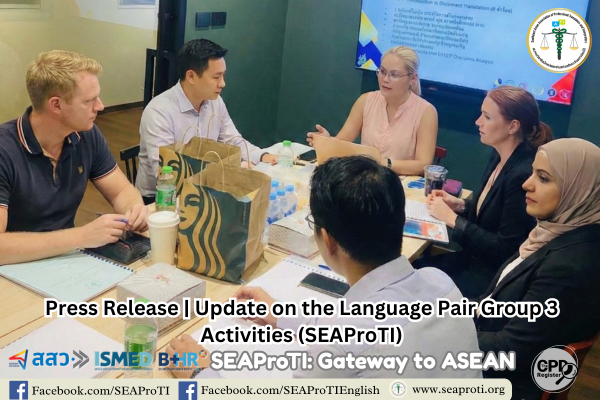Visa Exemption and Visa on Arrival in Thailand:
A Policy Analysis through Diplomatic, Economic, and Immigration Lenses
Visa policies are critical diplomatic and security tools that regulate cross-border movement and facilitate international relations. Thailand’s 2024 visa policy reform — particularly the expansion of the Visa Exemption (TR-60) and Visa on Arrival (VoA – TR-15) programs — reflects the government’s strategic efforts to boost economic recovery, promote tourism, and facilitate short-term business engagement. This article examines the scope and implications of these visa schemes, their legal framework, and their administrative and diplomatic significance in Thailand’s foreign policy context.
1. Visa Exemption (TR-60)
1.1 Policy Scope
According to the Ministry of Foreign Affairs of Thailand (as of 29 May 2024), passport holders from 93 countries and territories are entitled to enter Thailand without a visa for tourism and short-term business purposes, for a period not exceeding 60 days.
1.2 Sample Eligible Countries
- Europe: France, Germany, Italy, Spain, United Kingdom, Sweden
- Asia: Japan, China, India, South Korea, Vietnam, Singapore
- Americas: United States, Canada, Brazil, Mexico
- Oceania: Australia, New Zealand
- Africa: South Africa, Mauritius
1.3 Key Features
- Simplified travel process: No pre-arrival visa application required
- Business facilitation: Ideal for short-term meetings, conferences, and networking
- Tourism enhancement: Attracts higher-spending long-stay travelers
2. Visa on Arrival (VoA – TR-15)
2.1 Policy Scope
Nationals of 31 countries and territories may apply for a Visa on Arrival at designated immigration checkpoints for tourism purposes only, with a permitted stay of up to 15 days.
2.2 Requirements for VoA Applicants
- Completed application form
- One passport-sized photograph
- Proof of funds: minimum 10,000 THB per person / 20,000 THB per family
- A passport with at least one month’s validity and two blank pages
- Fully paid onward air ticket (departing within 30 days)
- Visa fee of 2,000 THB (cash only, non-refundable)
2.3 Limitations
- Non-extendable stay (except in cases of serious illness)
- Tourism-only: VoA cannot be used for business or employment purposes
3. Comparative Analysis
4. Diplomatic and Economic Implications
- Bilateral trust-building: Visa waivers reflect confidence and cooperation
- Grassroots economic stimulation: Short-term travelers support SMEs and local services
- Investment facilitation: Streamlined entry procedures benefit investors and business delegates
- Soft power and regional leadership: Thailand positions itself as an open and connected hub
5. Policy Recommendations
- Centralized digital information platform for real-time visa eligibility checks
- Promote e-Visa and e-Arrival Card systems to streamline VoA processing
- Expand bilateral visa waiver agreements , especially within ASEAN and strategic partner regions
- Regular policy evaluation based on immigration, tourism, and security data
Conclusion
Thailand’s current visa framework under the TR-60 and TR-15 categories illustrates the strategic balancing act between openness and control. These policies promote inbound travel, strengthen economic diplomacy, and reinforce Thailand’s image as a world-class destination for both tourism and business. Going forward, continual monitoring and reform, grounded in data and international best practices, will be essential to maintain a competitive advantage while upholding immigration integrity.
SEAProTI’s certified translators, translation certification providers, and certified interpreters:
The Southeast Asian Association of Professional Translators and Interpreters (SEAProTI) has officially announced the criteria and qualifications for individuals to register as “Certified Translators,” “Translation Certification Providers,” and “Certified Interpreters” under the association’s regulations. These guidelines are detailed in Sections 9 and 10 of the Royal Thai Government Gazette, issued by the Secretariat of the Cabinet under the Office of the Prime Minister of the Kingdom of Thailand, dated July 25, 2024, Volume 141, Part 66 Ng, Page 100.
To read the full publication, visit: the Royal Thai Government Gazette
การยกเว้นวีซ่าและวีซ่าเมื่อเดินทางถึงประเทศไทย:
วิเคราะห์เชิงนโยบายจากมิติการทูต เศรษฐกิจ และการบริหารจัดการคนเข้าเมือง
29 เมษายน 2568, กรุงเทพมหานคร – นโยบายการตรวจลงตรา (วีซ่า) ถือเป็นเครื่องมือด้านการทูตและความมั่นคงที่มีบทบาทสำคัญในการควบคุมการเดินทางข้ามพรมแดน และส่งเสริมความสัมพันธ์ระหว่างประเทศ การปรับปรุงและขยายขอบเขตการยกเว้นวีซ่าของประเทศไทยในปี 2567 สะท้อนถึงยุทธศาสตร์ของรัฐบาลในการกระตุ้นเศรษฐกิจ การส่งเสริมการท่องเที่ยว และการอำนวยความสะดวกในการติดต่อทางธุรกิจระยะสั้น บทความนี้จะวิเคราะห์รายละเอียดของนโยบายการยกเว้นวีซ่า 60 วัน (TR-60) และวีซ่าเมื่อเดินทางถึง (Visa on Arrival – TR-15) รวมถึงข้อพิจารณาทางกฎหมายและผลกระทบต่อระบบการบริหารจัดการคนเข้าเมือง
1. การยกเว้นวีซ่า (Visa Exemption Program – TR-60)
1.1 ขอบเขตของนโยบาย
ตามประกาศของกรมการกงสุล กระทรวงการต่างประเทศแห่งประเทศไทย ผู้ถือหนังสือเดินทางจาก 93 ประเทศและเขตปกครอง สามารถเดินทางเข้าประเทศไทยเพื่อวัตถุประสงค์ในการท่องเที่ยวและการติดต่อธุรกิจระยะสั้นโดยไม่ต้องขอวีซ่า สำหรับระยะเวลาไม่เกิน 60 วัน
1.2 ตัวอย่างประเทศที่ได้รับการยกเว้น
- ทวีปยุโรป: ฝรั่งเศส เยอรมนี อิตาลี สเปน สหราชอาณาจักร สวีเดน
- เอเชีย: ญี่ปุ่น จีน อินเดีย เกาหลีใต้ เวียดนาม สิงคโปร์
- อเมริกา: สหรัฐอเมริกา แคนาดา บราซิล เม็กซิโก
- โอเชียเนีย: ออสเตรเลีย นิวซีแลนด์
- แอฟริกา: แอฟริกาใต้ มอริเชียส
1.3 จุดเด่น
- ลดขั้นตอนทางราชการ: ไม่จำเป็นต้องยื่นคำร้องวีซาล่วงหน้า
- อำนวยความสะดวกทางธุรกิจ: เหมาะสำหรับผู้เข้าร่วมงานประชุม การเจรจาทางการค้า
- สนับสนุนการท่องเที่ยวคุณภาพ: ดึงดูดนักท่องเที่ยวระยะยาวระดับกลาง-สูง
2. วีซ่าเมื่อเดินทางถึง (Visa on Arrival – TR-15)
2.1 ขอบเขตของนโยบาย
ประชาชนจาก 31 ประเทศและเขตปกครอง สามารถขอรับวีซ่าเมื่อเดินทางถึง ณ ด่านตรวจคนเข้าเมืองในประเทศไทย เพื่อวัตถุประสงค์ในการท่องเที่ยว โดยสามารถพำนักได้ไม่เกิน 15 วัน
2.2 เงื่อนไขการยื่นคำขอวีซ่าเมื่อเดินทางถึง
- แบบฟอร์มคำร้องพร้อมกรอกข้อมูลครบถ้วน
- รูปถ่ายขนาดหนังสือเดินทาง 1 ใบ
- หลักฐานเงินสดไม่น้อยกว่า 10,000 บาทต่อคน หรือ 20,000 บาทต่อครอบครัว
- หนังสือเดินทางที่มีอายุเหลืออย่างน้อย 1 เดือน และมีหน้าว่างอย่างน้อย 2 หน้า
- ตั๋วโดยสารเครื่องบินขาออกภายใน 30 วัน
- ค่าธรรมเนียม 2,000 บาท (ชำระด้วยเงินสดเท่านั้น และไม่สามารถขอคืนได้)
2.3 ข้อจำกัด
- ไม่สามารถขอขยายระยะเวลาพำนักได้ ยกเว้นกรณีเจ็บป่วยที่ไม่สามารถเดินทางได้
- ใช้ได้เฉพาะเพื่อ “การท่องเที่ยว” เท่านั้น ไม่รวมการติดต่อธุรกิจ
3. การวิเคราะห์เชิงเปรียบเทียบ
| ประเด็น | Visa Exemption (TR-60) | Visa on Arrival (TR-15) |
|---|---|---|
| ระยะเวลาพำนัก | สูงสุด 60 วัน | สูงสุด 15 วัน |
| จำนวนประเทศที่เข้าร่วม | 93 ประเทศ | 31 ประเทศ |
| ต้องขอวีซาล่วงหน้าไหม | ไม่ต้อง | ขอวีซ่าหน้าด่าน |
| วัตถุประสงค์ | ท่องเที่ยว/ธุรกิจระยะสั้น | ท่องเที่ยวเท่านั้น |
| สามารถขยายวีซ่าได้ไหม | ได้ (บางกรณี) | ไม่ได้ (ยกเว้นเจ็บป่วย) |
4. มิติทางการทูตและเศรษฐกิจ
- ส่งเสริมความสัมพันธ์ระหว่างประเทศ: การยกเว้นวีซ่าเป็นสัญลักษณ์ของความไว้เนื้อเชื่อใจระหว่างประเทศ ซึ่งช่วยส่งเสริมความร่วมมือทางเศรษฐกิจ การศึกษา และวัฒนธรรม
- กระตุ้นเศรษฐกิจฐานราก: นักท่องเที่ยวระยะสั้นมีบทบาทสำคัญต่อภาคการบริการ การท่องเที่ยว และ SMEs ในท้องถิ่น
- ส่งเสริมการลงทุนและเจรจาธุรกิจ: การเข้าประเทศที่สะดวกช่วยอำนวยความสะดวกในการจัดประชุม การเยี่ยมโรงงาน และการเจรจาหุ้นส่วน
5. ข้อเสนอเชิงนโยบาย
- ควรมีระบบข้อมูลกลางออนไลน์ สำหรับตรวจสอบสิทธิในการยกเว้นวีซ่าแบบเรียลไทม์
- ส่งเสริมการใช้เทคโนโลยีดิจิทัล เช่น e-Visa และ e-Arrival Card สำหรับกลุ่ม VoA
- เพิ่มความร่วมมือกับประเทศในภูมิภาค เพื่อขยายข้อตกลงทวิภาคีด้านการยกเว้นวีซ่า
- ติดตามและประเมินผลนโยบาย อย่างเป็นระบบ โดยใช้ข้อมูลจากการเข้าออกประเทศและพฤติกรรมของนักท่องเที่ยว
สรุป
นโยบายการยกเว้นวีซ่าและการให้วีซ่าเมื่อเดินทางถึงของประเทศไทยในปี 2567 เป็นตัวอย่างที่ชัดเจนของการใช้นโยบายด้านการต่างประเทศควบคู่กับเป้าหมายด้านเศรษฐกิจ การออกแบบนโยบายอย่างรอบคอบเพื่อรองรับนักท่องเที่ยวคุณภาพ การอำนวยความสะดวกต่อภาคธุรกิจ และการควบคุมการเข้าเมืองอย่างมีประสิทธิภาพ ล้วนเป็นปัจจัยสำคัญที่ประเทศไทยต้องดำเนินการต่อเนื่องเพื่อรักษาสถานะการเป็นจุดหมายปลายทางอันดับต้น ๆ ของโลก
เกี่ยวกับนักแปลรับรอง ผู้รับรองการแปล และล่ามรับรองของสมาคมวิชาชีพนักแปลและล่ามแห่งเอเชียตะวันออกเฉียงใต้
สมาคมวิชาชีพนักแปลและล่ามแห่งเอเชียตะวันออกเฉียงใต้ (SEAProTI) ได้ประกาศหลักเกณฑ์และคุณสมบัติผู้ที่ขึ้นทะเบียนเป็น “นักแปลรับรอง (Certified Translators) และผู้รับรองการแปล (Translation Certification Providers) และล่ามรับรอง (Certified Interpreters)” ของสมาคม หมวดที่ 9 และหมวดที่ 10 ในราชกิจจานุเบกษา ของสำนักเลขาธิการคณะรัฐมนตรี ในสำนักนายกรัฐมนตรี แห่งราชอาณาจักรไทย ลงวันที่ 25 ก.ค. 2567 เล่มที่ 141 ตอนที่ 66 ง หน้า 100 อ่านฉบับเต็มได้ที่: นักแปลรับรอง ผู้รับรองการแปล และล่ามรับรอง


